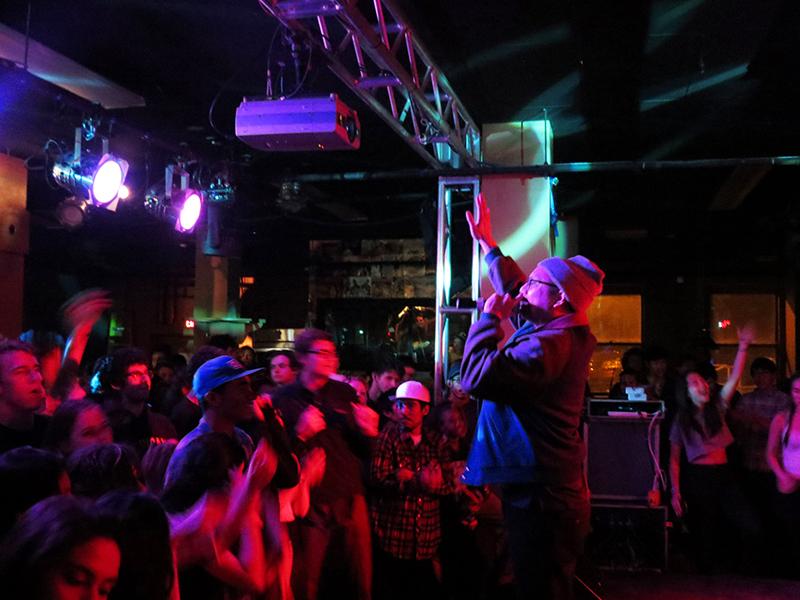AAAC Features Blue Scholars in Showcase
An energetic crowd claps and dances at the Blue Scholars ’Sco concert last Friday evening. The Seattle-based hip-hop duo sang about social justice and peace at a successful performance sponsored by the Asia America Art Collective.
November 21, 2014
Promoting inclusivity and self-expression is central to Blue Scholars’s mission; last Friday night, a frenzied mass of Oberlin students displayed wild enthusiasm for the pair’s vision at their ’Sco concert. The Oberlin Hip-Hop Collective and the Asia America Art Collective brought the Seattle-based hip-hop duo of George Quibuyen (MC Geologic) and Saba Mohajerjasbi (DJ Sabzi) to Oberlin as part of the AAAC’s two-day showcase. This concert was Blue Scholars’s first time back since its 2008 debut; the pair performed as part of a collective including acclaimed poet and chair of the Creative Writing department Kazim Ali and photographer Mia Nakano, who ran a tintype workshop.
Blue Scholars formed in 2002 when Quibuyen and Mohajerjasbi, both University of Washington students, met at a meeting run by the Student Hip-Hop Organization of Washington. Since its founding, Blue Scholars has released three full albums and four EPs and has come to be recognized as one of the top alternative hip-hop groups from the Pacific Northwest.
Blue Scholars, whose name plays on the term ‘blue collar,’ is recognized for its strong political, social and economic messages. The band’s powerful critique of social conformity, violence, socioeconomic inequality, racism, sexism and other forms of discrimination is why the Asia America Art Collective chose to feature it in their twoday-long schedule of events.
In a 2011 NPR interview, Quibuyen, who is Filipino-American, and Mohajerjasbi, who is Persian-American, discussed their efforts to raise awareness about the ethnic diversity of Seattle and to break down oppressive stereotypes.
Aside from their positive messages, their sound and engagement with the crowd, too, were impressive. There can never be too much quality hiphop music on Oberlin’s campus. With red and blue stage lights setting the mood, students crowding around the ’Sco stage did not hesitate to show appreciation for Blue Scholars by singing along to every song. “This isn’t just a concert… it’s a fucking party,” said Quibuyen, and the crowd roared its approval.
Students jumped up and down throughout the entire set, which included an interesting mix of slower, more soulful songs like “Sagaba,” and other quicker, more lively songs like “The Ave.” When the crowd insisted the concert continue as 1 a.m. quickly approached, Quibuyen jokingly asked if they could extend their play time until 2 a.m. and “rock a whole ‘nother hour?” Unfortunately, the ’Sco staff was not amused, and the chanting students settled for one final song. Lastly, Quibuyen passionately expressed his commitment to promoting peace and love through hip-hop. “[To promote inclusivity is,] above everything, why we are here,” Quibuyen said.
























